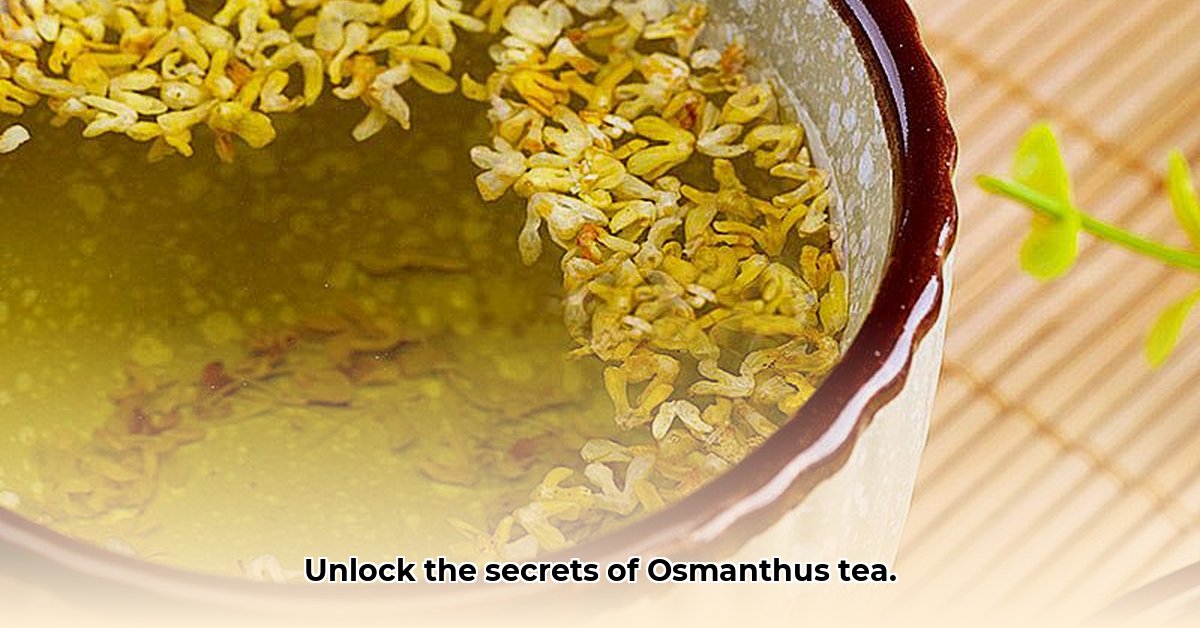
Understanding Osmanthus Tea: Aroma, Tradition, and Scientific Scrutiny
Osmanthus tea, renowned for its captivating apricot-honey aroma, holds a significant place in traditional medicine, particularly in Chinese culture. While anecdotal evidence and limited studies suggest potential health benefits, a critical evaluation of the scientific literature is crucial. This guide explores the purported advantages, the current state of scientific evidence, and the importance of responsible consumption. Many claim it offers a multitude of health benefits; however, is this truly backed by robust scientific evidence?
Exploring the Potential Benefits of Osmanthus Tea
While the delightful aroma alone makes osmanthus tea appealing, some propose various health benefits. These purported benefits often center around the tea's high concentration of antioxidants, natural compounds thought to combat cellular damage. Additionally, some preliminary research hints at potential anti-inflammatory effects. These findings, however, primarily emerge from in-vitro (lab) studies or animal models. While promising, these results don't yet translate to definitive proof of human health benefits. The long history of osmanthus tea usage in traditional Chinese medicine offers an intriguing context, but constitutes observational evidence rather than conclusive scientific proof. How can we objectively assess the evidence supporting these claims?
Antioxidant and Anti-inflammatory Properties: A Closer Look
Preliminary studies suggest osmanthus tea might possess both antioxidant and anti-inflammatory properties. Antioxidants help neutralize harmful free radicals, while anti-inflammatory actions may help reduce inflammation within the body. However, these findings, largely from laboratory settings, require further investigation and verification through large-scale, human-based clinical trials. The current body of evidence offers a glimpse into potential benefits, but falls short of providing definitive confirmation.
Digestive Health and Skin Health: Traditional Uses and Scientific Gaps
Traditional Chinese medicine has long associated Osmanthus tea with improved digestion and healthy skin. While these practices offer valuable historical context, they lack the rigorous scientific backing needed to establish a direct causal link. More research, particularly well-designed clinical trials involving humans, is critically needed to validate these traditional applications. What research methodologies are required to solidify these claims?
The Limitations of Current Scientific Knowledge
The most significant limitation in assessing osmanthus tea's purported health benefits is the scarcity of large-scale, high-quality human studies. Most research to date is pre-clinical, relying on in-vitro studies or animal models. While this preliminary data provides a foundation for further investigation, it cannot definitively confirm the benefits observed in these settings extend to human health. This gap in conclusive evidence highlights the need for more rigorous scientific investigation to translate promising preliminary findings into established health benefits.
Osmanthus Tea: Safety and Responsible Consumption
While generally considered safe for most individuals, those with allergies to plants in the olive family (Osmanthus belongs to this family) should exercise caution. Furthermore, potential interactions with certain medications, such as blood thinners, warrant careful consideration. If you are on any medication or have any underlying health conditions, consult your healthcare provider before incorporating osmanthus tea into your diet. Begin with small quantities to assess any potential adverse reactions. Responsible consumption is paramount, even with a product as seemingly benign as osmanthus tea.
The Path Forward: Future Research and Informed Choices
The journey toward fully understanding the potential health effects of Osmanthus tea requires further investigation. Well-designed, human-based clinical trials are imperative to establish its efficacy and safety definitively. These studies should address the specific purported benefits, employing robust methodologies to determine any significant impact on human health. Only through rigorous scientific scrutiny can we move beyond speculation and confidently assess osmanthus tea's true impact.
Osmanthus Tea: A Balanced Perspective
The captivating aroma and rich history of osmanthus tea contribute to its appeal. While early studies hint at potential benefits, it's vital to approach claims with a critical eye. Enjoy the delightful taste and aroma, but remember that robust scientific evidence is still needed to confirm many of the purported health benefits. Informed consumers should always prioritize evidence-based information and consult their healthcare provider before making changes to their diet, including the addition of herbal teas.
Key Takeaways:
- Osmanthus tea offers a delightful flavor and aroma.
- Many health benefits are claimed, but scientific confirmation is lacking.
- Large-scale human studies are needed to establish efficacy.
- Responsible consumption and professional consultation are advisable.